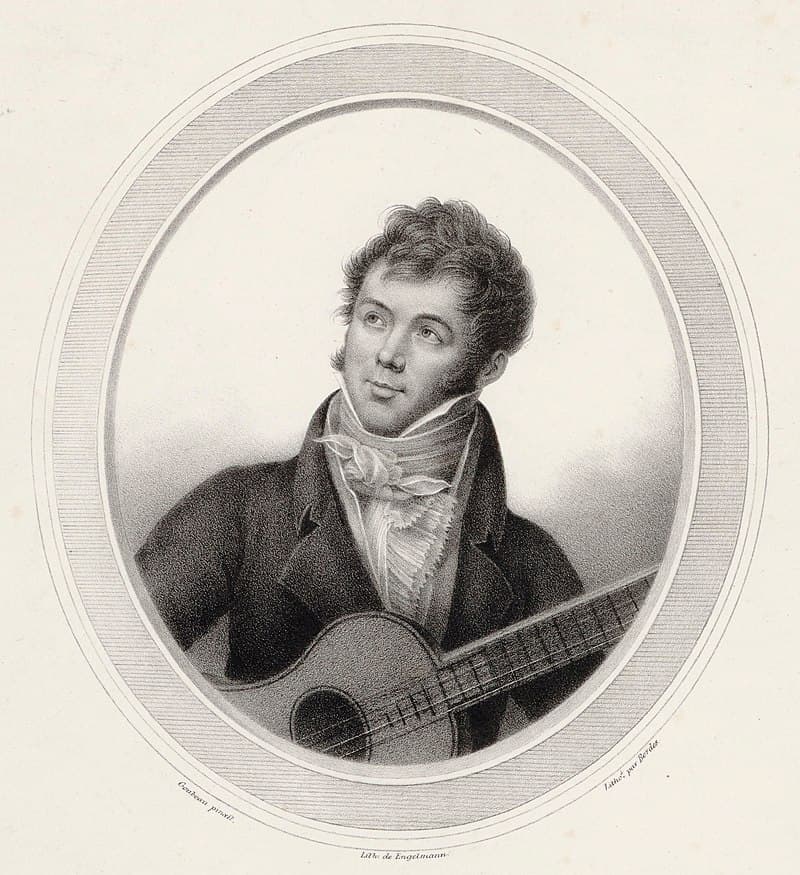After starting his career in the military, as was the tradition in his family, Fernando Sor (1788–1839) worked for the invading French military and then moved to Paris when they departed, fearing retribution for his work with the occupiers. While he was in the military, with the rank of lieutenant, he continued his music, both playing and composing. Paris was the point where he left the military behind and returned to his musical life. As a child, he had studied music and the guitar and was in the choir of the Montserrat monastery before the military claimed him.

His career in Paris was interrupted by a stay in London, where he taught guitar and singing and composed the balled Cendrillon (Cinderella). Following London, he moved to Moscow in 1823 before returning to Paris in 1827.
His concern with harmonic refinement, in contrast with other guitarists/composers of his time, earned Sor the nickname of ‘Beethoven of the guitar’ by the historian François-Joseph Fétis. He never wrote a guitar concerto but did write 4 guitar sonatas, some Fantasias, and some Theme and Variations sets. His guitar method (1830) was one of the most important of the time.
Just as the best pianists in Europe gravitated towards Paris, so did the best guitarist. There had been a fad for the guitar that started under Napoleon and, during the Bourbon Restoration, only grew bigger. Many guitarists newly arrived in the city claimed that they had been students of Mauro Giuliani (1781–1829) in Vienna, and others brought the new Italian bel canto style to the instrument. Sor, on the other hand, remained conservative, writing music with ‘clear polyphony, full harmonies, and the measured proportions of classicism…’, hence Fétis’
One of his most famous works is his set of variations on a well-known folksong of the day: Malborough s’en va-t-en guerre (Marlborough has left for the war). The original folksong is a burlesque lament on the death of John Churchill, 1st Duke of Marlborough (1650–1722). The song is based on a false rumour of Churchill’s death and ‘how Marlborough’s wife, awaiting his return from battle, is given the news of her husband’s death. It also tells that he was buried and that a nightingale sang over his grave’. Sor’s variation set was published in Paris in 1826.
The song was popular in Versailles, having been one of the cradle songs of Louis XVII of France, and from Versailles, passed down from the kitchen to the stable, from Paris to other French cities, and from France to England. After Sor wrote his variation set, the melody made its way to Latin America. By the 19th century in England, the melody was now used with the world ‘For He’s a Jolly Good fellow’ and in the US, it became a popular song to the words of ‘The Bear Went over the Mountain’.
Fernando Sor: Variations for Guitar on Marlborough s’en va-t-en-guerre, Op. 28 (Christian El Khouri, guitar)

Christian El Khouri
The guitarist on this 2022 recording is Italian guitarist Christian El Khouri, who studied at Milan’s ‘Giuseppe Verdi’ Conservatory. His 2020 recording of the music of Mauro Giuliani included a world premiere recording of Giuliani’s Op. 46, Choix de mes fleur chéries.

Fernando Sor: Variations for Guitar on Marlborough s’en va-t-en-guerre, Op. 28
Performed by
Christian El Khouri
Official Website
For more of the best in classical music, sign up for our E-Newsletter



